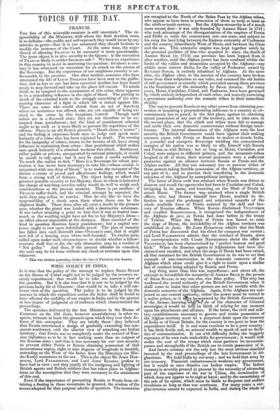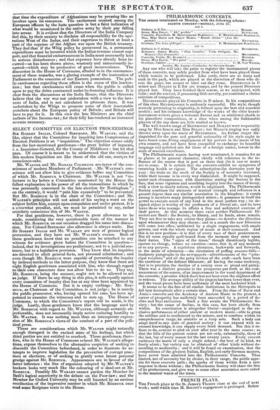WHIG POLICY IN INDIA.
IT is true that the policy of the attempt to replace Snail SUJAH on the throne of Cabul ought not to be judged by the reverses re- cently experienced : that would be to take too narrow a view of the question. But it is also true that it is not-to be judged by the previous lucky hit at Ghuznee : that would he to take a !still nar- rower view, of the question. The policy is to be judged by the manner in which the expedition across the Indus shall be found to have affected the stability of our empire in India, and by the greater or less degree of judgment or of rashness which characterized the proceedings. The speeches delivered by the late Ministers in the House of Commons on the 23d June, however unsatisfactory in other re- spects, intimate at least the $rrounds upon which they rest their de- fence of this enterprise. 1 hey are briefly these : they believed that Russia entertained a design of gradually extending her con- quests southward, with the ulterior view of attacking our Indian territory ; that Persia was so completely under the control of Rus- sian diplomacy as to be in fact nothing more than an outpost of the Russian army ; and that it was necessary for our own security to prevent either Persia or Russia obtaining possession of that mountainous region, eight or nine degrees of longitude in breadth, extending on the West of the Indus from the Himalaya (or Hin- du-Kush) mountains to the sea. This is the object Sir &air; Holt- HOUSE, Lord PALMERSTON, and Lord JOHN RUSSELL profess to have had in view ; and they justify all the intriguing and fighting of British agents and British soldiers that has taken place in Afghan- istan on the assumption that they were necessary to the attainment of this end.
Even if the importance of preventing Russia or Persia from ob- taining a footing in these mountains be granted, the wisdom of the means adopted for that purpose admits of question. The mountains are occupied to the North of the Bolan Pass by the Afghan tribes, who appear to have been in possession of them as early at least as the ninth or tenth century. But the Afghan monarchy is of a much more recent date : it was only founded by ARMED SHAH in 1747; who took advantage of the disorganization of the empires of Persia and Delhi to unite his countrymen into one state, and subject to his sway the land lying between the Eastern extremity of Cashmere and the country immediately West of Herat, and between the Oxus and the sea. This extensive empire was kept together solely by the personal qualities of him who acquired it : since the death of Austen Sums (in 1773) one province has been lopped from it after another, until the Afghan power has been confined within the limits Of the vallies and mountains occupied by the Afghans—nay within more narrow limits, for the valley of Peshawur' seized by RUNJEET SINGE, is entirely inhabited by Afghans. At the same time, the Afghan clans in the interior of this country have broken loose from their subjection to one ruler, and resumed the old habits of self-government or anarchy which prevailed among them previous to the foundation of the monarchy by SHAH ARMED. For many years, Herat, Candahar, Cabul, and Peshawur, have been governed by chiefs entirely independent of each other, and scarcely exercising a precarious authority over the nomade tribes in their immediate vicinity.
The way to prevent Russia or any other power from obtaining pos- session or acquiring a preponderating influence in a country so cir- cumstanced, was to guard, in the first place, against its obtaining actual possession of any part of the territory, and to take care, in the second place, that the chiefs and tribes were left to manage and settle their own domestic' controversies without foreign inter- ference. The internal dissensions of the Afghans were the best security the British Government could have against their making common cause with Persia or Russia to molest or invade India. A powerful and energetic Sovereign wielding the concentrated energies of his nation was as likely to ally himself with Russia and Persia as with-Britain: but so long as Herat, Candahar, and Cabul, were subject to different princes, and the mountain-tribes laughed at all of them, their mutual jealousies were a sufficient guarantee against an alliance between Russia or Persia and the Afghan nation. All that was necessary was to prevent either of these powers taking forcible possession ,of the Afghan territory, or any part of it ; and to prevent their interfering in the domestic concerns of the Afghans by surreptitious intrigues.
The latter of these ends was attained when Russia was driven to disavow and recall the agents who had been in Candahar and Cabul, intriguing in its name, and hounding on the Shah of Persia to attack Herat. The former waa attained when a single British officer, who had thrown himself into Herat, enabled its de- fenders to repel the prolonged and reiterated assaults of the whole available force of Persia assisted by the skill and bra- very of Russian officers. When Russia disclaimed Vicoviracii and recalled Simoruvrrscri it recognized the independence of the Afghans de jure, as Persia had done before in the treaty of Tehran. When the Shah of Persia was 'forced to raise the siege of Herat, the inviolability of the Afghan territory was established de facto. Sir Jour; HOBHOUSE admits that the Shah of Persia has discovered that his thirst for conquest was unwise; and Lord Esiosizasrori admits that the conduct of Russia, since his correspondence with Count NESSELRODE about the affair of Vicovirscii, has been characterized by "perfect honour and good faith." When the Russian agents in Afghanistan had been dis- claimed and recalled, and when the siege of Herat had been raised, all that remained for the British Government to do was to set that example of non-intervention in the domestic concerns of the Afghans which alone could give it a right to insist upon a similar line of conduct being adopted by Russia and Persia. Any thing more than this was superfluous ; and above all, the attempt to reestablish the monarchy of ARMED SHAH in the person of SHAH SUJAH, or any one else, was false policy. This step has weakened the moral authority of the British Government when it shall come to insist that other powers are not to meddle with the domestic concerns of the Afghans. Again, if the Afghans are sub- jected to one central aighority, either the power must be vested in a native prince or it iTist beseptined by the British Government. If the former, wiliMie%do of the character of Oriental sovereigns, it would be folly.tqthink of relying for one moment upon his attachment and alliance. If the latter, the civil and mili- tary establishments necessary to govern and retain possession of the Afghan territory must be a perpetual drain upon the treasury of India or of Great Britain, for the country is too poor to bear the expenditure itself. It is and must continue to be a poor country : it has little fertile soil, no mineral wealth to speak of, and no facili- ties of communication. It can with difficulty defray the beggarly expenses of its own rude makeshifts for government ; it would sink under the cost of the troops which must garrison its mountain- passes and strongholds if the British are to retain possession of it. And herein consists not the only but the most obvious mischief incurred by the mad proceedings of the late Government in Af- ghanistan. We hold India by our army ; and we hold that army by our treasury. Financial embarrassment weakens any government, but it would at once dissolve our Indian empire. The Indian treasury is severely pressed at present by the necessity of advancing part of the expenses of the war in China, the termination of which does not appear to be nigh at hand ; and by the uncertainty of the sale of its opium, which must be liable to frequent and sudden revulsions so long as that war continues. For many years a sur- plus revenue cannot be expected in India, and during the whole of that time the expenditure of Afghanistan may be pressing like an incubus upon its resources. The excitement created among the European officers by the bat& question is but a faint indication of what would be occasioned in the native army by their pay falling into arrear. It is evident that the Directors of the India Company feel this, by their anxiety to disclaim all responsibility for the ope- rations West of the Indus, and their eagerness to throw at least a part of the expense of the Afghan war upon the British treasury. They feel that if the Whig policy be persevered in, a permanent expenditure must be incurred which the Indian revenue cannot sup- port, and that financial embarrassment in India must necessarily lead to serious disturbances ; and that expenses have already been in- curred—as has been shown above, wantonly and unnecessarily in- curred—which may be productive of great inconvenience. The discussion in the House of Commons, alluded to in the commence- ment of these remarks, was a glaring example of the inattention of Parliament to the concerns of our Eastern possessions. The pub- lic carelessness regarding these affairs is the cause of this inatten- tion; but that carelessness will cease when the public is called upon to pay the debts contracted under its fostering influence. It is clear from the discussions at the `India House, that the Directors believe that the war was not undertaken with a view to the inte- rests of India, and is not calculated to ptomote them. It was undertaken by the Whigs to promote some of their inscrutable crotchets about the European policy of Britain ; and Britain will have to pay for it. In this view the late Ministers are the chief authors of the Income-tax ; for their folly has rendered an increased
revenue necessary. .



























 Previous page
Previous page